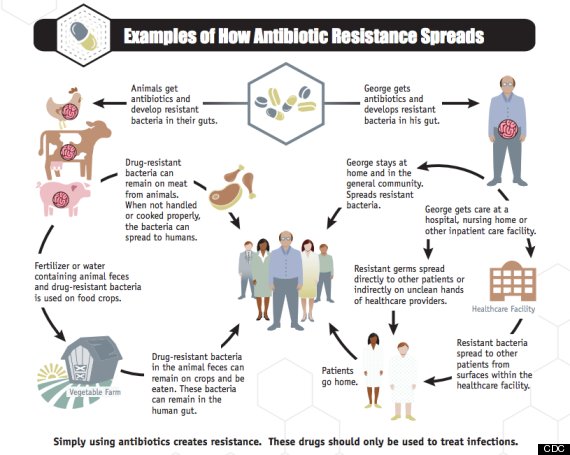CDC has released a new report, Antibiotic Resistance Threats in the United States 2013.

The report provides a unique look at the threats and the burdens that are posed by many See chart (antibiotic-resistant germs) that are threatening public health.
Every year in the US, more than two million people are infected with a bacteria that is resistant to antibiotics, and more than 20,000 people die every year due to such infections. Many more Americans die every year from conditions that are complicated by an infection that is resistant to antibiotics. This is a growing public health problem that many public health professionals, such as epidemiologists, are having to spend much more time combating.
Infections that are resistant to antibiotics may happen anywhere. Data indicates that most occur in the general US community, but many deaths that have something to do with antibiotic resistance can occur in health care settings, including nursing homes and hospitals.
YouTube Special Feature
The CDC is sending out a serious warning about bacteria that is resistant to many strong antibiotics. And these strains of bacteria are spreading fast. Laci explains what’s caused these bacteria to mutate and what you can do to protect yourself.
The report is a good reference for anyone who needs information about resistance to antibiotics. It is designed to be easy to access for many different audiences. It covers many types of bacteria that can cause severe infections in humans, and the antibiotics that are currently used to treat such infections. Also, Candida, which is a fungus that can cause serious illnesses, also is included because it is showing a higher resistance to drugs that are being used for treatment.
Drug resistance that is related to HIV and influenza are not in this report, and drug resistance to malaria is not included either. These, the report notes, are very important problems, but are beyond the scope of this particular report.
The introduction of the CDC report states that infections that are resistant to antibiotics can cause serious and avoidable costs to an overburdened health care system. In many cases, these infections require longer and more expensive treatments, longer hospital stays, more doctor visits and hospital visits, and the result is more death and disability when compared to infections that can be treated with antibiotics. The total cost to the economy of antibiotic resistance in the US has been hard to figure, but estimates are as high as $20 billion in extra health care costs, and $35 billion a year for additional costs to society in terms of lost productivity.
Antibiotic use is the most important reason that antibiotic resistance is increasing around the world. Antibiotics are some of the most frequently prescribed drugs that are used in human medicine. However, as much as 50% of all antibiotics that are prescribed are not needed, or are not as effective as they are prescribed to be. Antibiotics also are often used in animal feed to prevent disease, and to promote growth of animals that produce food. Antibiotic use to promote growth is not needed, the CDC report states, and the practice should be stopped.
SEE ALSO: Antibiotic Resistance Declared A ‘Serious Health Threat’ By CDC As Use In Meat Industry Skyrockets
Another major reason for the growth of antibiotic resistance is the increase of resistant strains of many types of bacteria that are spread from one person to the other, or from sources that are non human in our environment, including food. See chart above.
There are four actions that the report states will help to fight such deadly infections:
-
Stop infections and stop the spread of resistance
-
Track bacteria that is resistant to antibiotics
-
Improve use of antibiotics in medicine
-
Promote the growth of new antibiotics, and develop new tests for resistant bacteria
The report states that while many bacterial resistance problems are serious, gram-negative pathogens are a particular problem. They are getting more resistant to all types of drugs that may be considered for treatment. The report notes that the most serious infections are associated with health care, and the most common ones are Enterobacteriaceae, pseudomonas aeruginosa, and acinetobacter.
For more discussion on antibiotic resistant threats, please see these insightful sources:
- www.care2.com/greenliving/antibiotic-drug-resistant-threat-growing-at-alarming-rate-warns-cdc-infographic.html
- www.rollcall.com/news/3_bacteria_have_antibiotic_resistance_at_urgent_level-227812-1.html
- www.thepigsite.com/swinenews/34351/weekly-overview-the-antibiotic-resistance-crisis-is-farming-to-blame
- scienceblogs.com/thepumphandle/2013/09/20/cdc-classifies-three-antibiotic-resistant-bacteria-as-urgent-threats/
- www.wired.com/wiredscience/2013/09/cdc-amr-rpt1/
- www.washingtontimes.com/news/2013/mar/19/antibiotic-resistant-superbugs-alarm-health-care-i/






